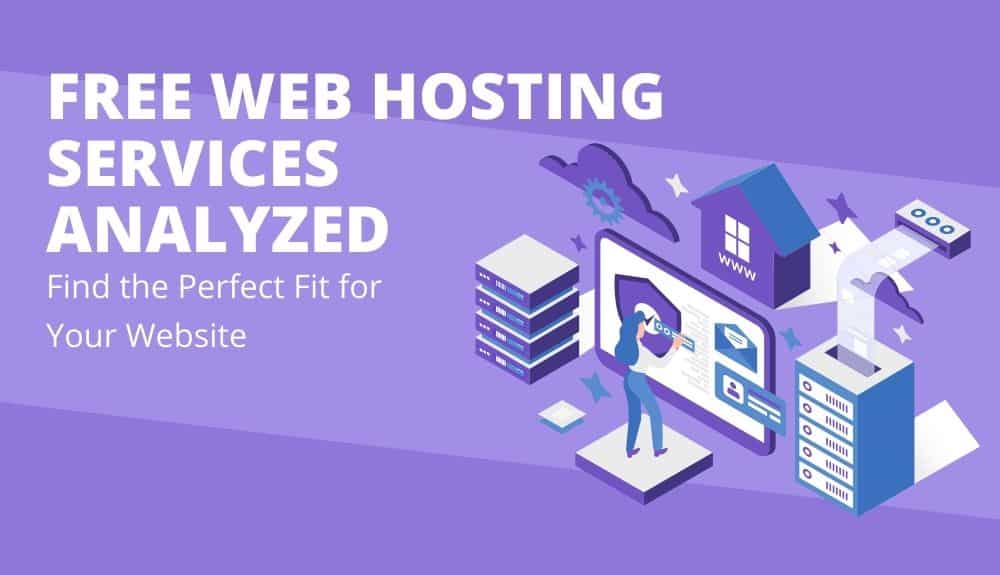- 10th Jan, 2024
- No Comments
Free Web Hosting Services Analyzed: Find the Perfect Fit for Your Website

This blog explores some of the free web hosting services available that focus on factors like performance, storage, bandwidth, and customer support. It also examines the pros and cons of each web hosting service that will help users determine which web hosting will be best for online presence.
What is Web Hosting?
Basically, web hosting refers to the service that provides infrastructure and technologies to construct and operate a website on the internet. It includes the construction of the website to its management and uploading files and data on the server. It concerns the user publishing their website files on the internet.
Importance of Web Hosting

For a successful online presence, it is very important to have a reliable web hosting provider. The importance of web hosting is as follows:
Website Performance and Loading Speed
Hosting directly impacts the performance and functioning of the website. A strong and reliable hosting server provides a fast loading time and a smooth user experience. On the other hand, a poor server makes the website load slow, which can eventually frustrate the visitors.
Uptime and Reliability
A strong also provides good uptime of a website. Uptime means how long a website is continuously working. A good uptime ensures more online presence, leading to more visitors to the website.
Security and Data Protection
The safety & security of a website holds paramount importance. A poor server can make a website more prone to online attacks and breaches. Therefore, it is essential to use a hosting provider that provides backups, firewalls, and malware scanning. Using a reliable hosting provider that will ensure adequate safety measures is highly suggestive.
Scalability and Flexibility
In the process of growing a website, it requires additional resources and more storage facilities and bandwidth. A good hosting service provider offers scalability, allowing for easy upgrades that will help accommodate increased website traffic.
Types of Web Hosting

Various types of web hosting cater to different needs. Common types include:
Shared Hosting
Under the setup of shared hosting, multiple websites share a single server resource. It is quite an affordable option suitable for small businesses with moderate traffic.
VPS Hosting
A specific portion is dedicated to a server to its own resources. It is a more powerful option as each website has its resources. It also provides extra advantages of more control and flexibility, which makes an ideal choice for users who need more power and customization.
Dedicated hosting
Dedicated hosting is a more expensive option. In this setup, each website has its own physical server. Generally, users have high traffic volume and substantial databases or resources.
Cloud hosting
Cloud hosting is a very flexible and also a cost-effective option for all. Cloud hosting uses virtual technology to pool resources from multiple servers in the cloud.
Factors to consider before choosing a web hosting service provider
It is essential but also subjective to choose a reliable hosting service provider. Every website model is different and needs different resources to flourish online. Here are some points to consider before choosing a hosting provider.
Pricing model and plans
Budget is no doubt a determining factor before choosing a hosting provider. There are some providers which provide free hosting services but with limited features. Users with low budgets and fewer needs can avail of these features.
Features and resources
When looking for features, look for service providers that offer services like unlimited bandwidth, storage space, email addresses, and a free SSL certificate. These features are essential for the smooth functioning and security of the website. Additionally, also look for a provider which is willing to provide a free domain name or website builder.
Customer Support
In the world of web development, there are various challenges that user can face. A good service provider should have 24/7 customer support on multiple channels so that any query or technical difficulty of the user can be resolved instantly. Prompt and efficient customer service makes a website function smoothly.
Uptime and Performance
Uptime ensures that the website has an online presence and very little unavailability. It is suggestive to use a service provider that guarantees 99.9% uptime. Also, as data storage center and server locations significantly affect the website’s loading speed, so consider their locations too before opting for hosting services.
Free Web Hosting: Pros and Cons

When deciding between free and paid web hosting it is important to assess the advantages and disadvantages of each to determine the best option for a website.
Free web hosting
Free web hosting provides a cost-effective solution for individuals or small businesses seeking an online presence. It allows users to host their website or blog for free on a web server. It is best suited for initial users or low-profile websites. However, it also comes with certain limitations.
Advantages
Some advantages of free web hosting websites include the following:
Costs: in this, users can freely avail of web hosting services that do not require any monetary contribution, making it an ideal choice for budget concerns.
Quick Setup: Easy-to-use website builders and ready-made templates allow one to set up the site quickly.
Perfect for Test Sites: They are just perfect for playing around with web design or testing ideas with none of the financial risks.
Convenience: Contributions of software and tools are available pre-installed to assist the newbie with no technical skills.
Limited Features: Minimal resources, storage, and bandwidth are just fine for small websites or low-traffic content.
Disadvantages
Here are some disadvantages associated with free webhosting.
Customization Restrictions: There are certain limitations posed on free hosting concerning website customization; it limits the options for theme, plugin, and coding one can apply.
Name and Advertisements: Some free hosts display ads on these free sites, affecting the brand image and user experience.
Performance: Other sites on the same server can create performance issues, slow loading times, or downtime because they share the same server.
Customer Service Support: Free hosting services typically provide limited support, such as online forums or email, and response times usually aren’t as good as picked options.
Analyzing the Best Free Web Hosting Services
FreeWebsite.com
Features
The free plan offers limited disk space and bandwidth
Website builder for easy customization
The free domain name included
Offers additional features such as SSL certificate and email address
Performance
Generally reliable uptime
Good loading speed for small websites
Customer Support
Limited customer support options for free plan users
WebHoster.com
Features
The free plan includes a basic hosting account
Unlimited bandwidth for optimal performance
Website builder with various templates
Free trial for paid plans
Performance
Generally stable performance with few downtimes
Fast loading speed for small to medium-sized websites
Customer Support
Responsive customer support via live chat and email
FreeHostToday.net
Features
The free plan offers limited storage space and bandwidth
Website builder with customizable templates
Free SSL certificate for secure browsing
Additional features available for paid plans
Performance
Generally decent uptime and loading speed
Suitable for static sites or test websites
Customer Support
Limited customer support options for free plan users
MyFreeSite.com
Features
The free plan includes a basic hosting account
Drag-and-drop website builder for easy customization
Free subdomain
Optional upgrade for additional features
Performance
Reasonable uptime with occasional downtimes
Average loading speed for small websites
Customer Support
Limited customer support options for free plan users
Websiter.com
Features
The free plan offers limited storage and bandwidth
Website builder with customizable templates
Free SSL certificate for secure browsing
Additional features available for paid plans
Performance
Generally stable performance with few downtimes
Good loading speed for small to medium-sized websites
Conclusion
Choosing the right web hosting service is crucial for online success, whether it is a personal blog or a highly professional online portfolio. While there are some free web hosting services offering cost-effective solutions for beginners but they come with certain limitation which is not suitable for professional websites.
For users with specific needs, such as high traffic, advanced customization options, and consistent support, paid hosting services may be the more reliable option. There are free web-hosting services for those websites that are low on traffic or for testing ideas without spending any money from a pocket. Also, it is essential to weigh the options in making the final pick of the suitable service as per your requirement and ensure that you are well-informed to suit the purpose of your website.
